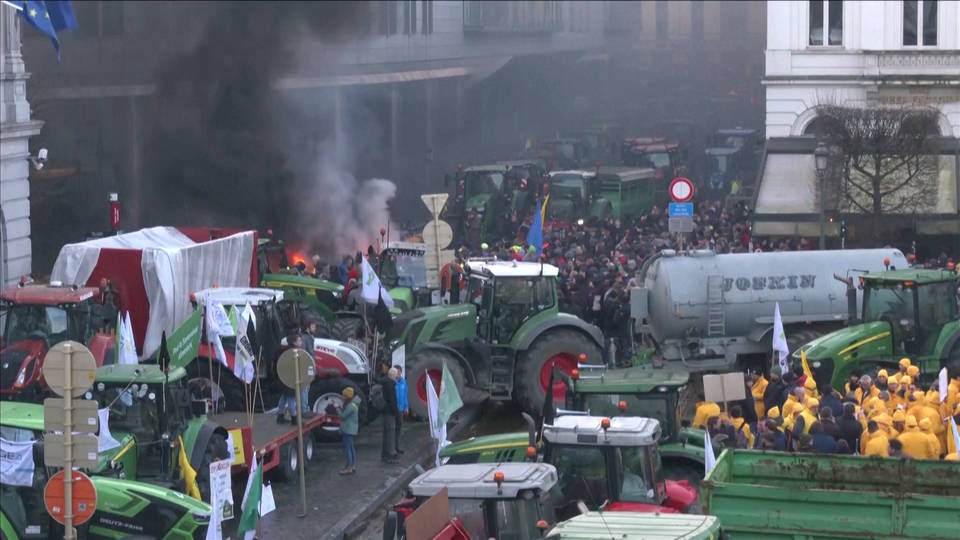As Brussels braces for an agricultural uprising, European farmers turn the EU headquarters into a crop circle of discontent, with tractors replacing tie-wearing lobbyists.
Ahead of the European Council session, hundreds of farmers have descended on central Brussels to blockade the city, bringing the current wave of agrarian dissatisfaction throughout Europe to the EU’s doorstep.
Tonight, tractors are blocking various parts of the city. A key supply center for the Belgian grocery chain Colruyt was briefly blockaded by farmers on Sunday, 20 kilometers southwest of Brussels, as they demonstrated against harsh new environmental laws and the threats the conflict in Ukraine poses to the European agriculture sector.
Join us on Telegram: https://t.me/tfiglobal
A tiny convoy of tractors has been stationed five minutes away from the EU’s administrative core since Monday. On Wednesday afternoon, barricades and barbed wire were visible outside the European Parliament and Commission building.
The European Council meeting this week is scheduled to coincide with the planned farmer demonstrations. Expected to come are the prime ministers of all 27 EU states to debate the bloc’s future financing obligations to Ukraine in light of Hungary’s position opposing taking on debt to support Ukraine’s war endeavors.
Representatives from the farming community have stated that they will determine how long the direct action to disrupt the city should go on the ground. Yesterday around 8 a.m., authorities anticipated the blockade off the European Quarter’s center. A farmer declared, One farmer said, “Time is up. EU leaders must think of the farmers. Talk to the farmers rather than about the farmers.”
On Wednesday, Lithuania and Italy became the most recent nations to witness farmer protests. Farmers contend that Europe’s agriculture sector is in dire need of rescue from the damaging impacts of the EU’s green transition and low-cost imports from nations not bound by EU laws.
There are indications that the wave of farmer protests shook European cities and had a quantifiable impact on EU policy. Following farmer protests, the Macron government in France retracted its support for the Mercosur trade pact with South America, while the Commission just conceded nominal ground on severe new rewilding edicts.
What’s fueling this widespread protest among farmers in Europe? The root cause lies in the repercussions of the war in Ukraine, which has become a headache for European farmers, prompting them to take a stand. It’s not just the farming community; truckers and transporters are also joining forces in a united front against the EU.
Read More: “If you’re offended, leave”, Muslims in Ireland are getting offended by simple Irish jokes
In the not-so-distant past, the Netherlands witnessed a farmer uprising, with 40,000 agricultural warriors flooding the streets in protest against the government’s ambitious emission reduction plans. The proposal aimed to cut nationwide pollutants by 50% by 2030, forcing Dutch farmers to downsize their livestock herds and cease operations, leading to a clash that resonated across Europe.
As tractors blocked highways, the protest spread like wildfire, reaching Poland, where truckers amplified the disruption. This unrest affected Ukrainian exports, causing a significant slowdown and even complete halts at certain border checkpoints.
Polish truckers, frustrated by what they perceived as Ukraine, backed by the EU, stealing their jobs through cheaper transport services, blocked road crossings since November. The repercussions echoed beyond borders, impacting Ukrainian exports and intensifying the simmering discontent.
The rebellion didn’t stop at the Polish border; it marched into Germany. German farmers, bundled up against January’s chill, revolted against Chancellor Olaf Scholz’s austerity measures, particularly the slashed diesel subsidies and tax breaks for agricultural vehicles. Thousands converged on Berlin, disrupting highways and sending a clear message that they won’t bear the brunt of budget deficits created by government decisions.
The large-scale protests by German farmers, which have been raging across the country since 8th January and have caused serious traffic disruption, are an echo of a movement that took place in France in November, said FNSEA director Arnaud Rousseau.
“These movements all have the same root cause: the growing gap between the reality of farmers’ practices on the ground and the administrative decisions centralised in Brussels, which are creating a revolt,” said Rousseau.
Simultaneously, French farmers pushed for an EU Commission-imposed cap system to counter the surge in imports from Ukraine. Five organizations representing EU food producers sought protection against market disruptions caused by liberalized imports from Ukraine, cautioning that the current burden on the agricultural sector was unsustainable.
Read More: Code Red for the EU: Ignoring Russia Sparks Crisis
Following Russia’s military operation in Ukraine in June 2022, the EU temporarily lifted import restrictions, flooding the market with Ukrainian products. This influx, coupled with the ongoing aid efforts, triggered a domino effect. Prices plummeted in frontline nations like Hungary, Poland, Slovakia, Bulgaria, and Romania, adding fuel to the fire of discontent.
In Romania, farmers and transporters took to the streets, blocking highways in protest of costly civil liability insurance. Their grievances ranged from exorbitant auto liability insurance prices to non-discriminatory fiscal treatment and a call for anti-dumping legislation to combat unfair competition.
The collective discontent across Europe paints a clear picture—farmers, transporters, and truckers vehemently oppose ongoing aid to Ukraine. This widespread uprising underscores the challenges Europe faces, with farmers emerging as the most significantly affected group. From Dutch protests against emission reductions to Polish truckers’ frustrations over perceived job losses, German farmers rallying against austerity, and surprising French participation, the common thread is a resounding rejection of additional aid to Ukraine, creating a continent-wide upheaval. The war in Ukraine is not only a geopolitical challenge; it’s sowing seeds of discontent that are flourishing in the fields of European agriculture.
